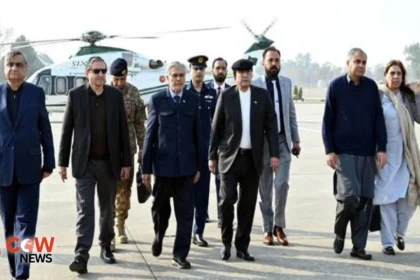The annual inflation rate in Pakistan has experienced a noteworthy decline, dropping to 6.9% in September 2024. This figure represents a dramatic fall from the staggering 31.4% recorded in the same month last year, according to the latest data released by the Pakistan Bureau of Statistics (PBS). This development marks a crucial turning point for the country’s economy, which has been grappling with soaring inflation and various economic challenges in recent years.
A Historic Drop in Inflation
For the first time in several months, inflation has fallen into single digits, providing a glimmer of hope for consumers and policymakers alike. The significant decrease is a result of various factors, including improved supply chains, reduced global commodity prices, and government interventions aimed at stabilizing the economy.
In a month-to-month comparison, the inflation rate fell by 0.5% from August 2024, when it was recorded at 9.6%. This decline is particularly significant as it comes in lower than the government’s projections of 8-9% for September and October, indicating that the measures taken to curb inflation are beginning to bear fruit.
Regional Disparities in Inflation Rates
A closer examination of the data reveals stark contrasts between urban and rural inflation rates. In urban areas, the inflation rate reached 9.3%, while rural regions experienced a significantly lower rate of 3.6%. This disparity highlights the differing economic realities faced by urban and rural populations, with urban dwellers often grappling with higher costs of living.
The Impact of Food Prices
One of the most encouraging aspects of the recent inflation data is the substantial decrease in the prices of essential food items. For instance, tomatoes saw a price drop of 24.34%, vegetables decreased by over 18%, and fruits fell by 4.49%. Similarly, wheat flour prices declined by 5.53%, and the price of wheat itself dropped by 4.46%. These reductions are crucial as food prices have a significant impact on overall inflation and consumer purchasing power.
The government has attributed these decreases to improved agricultural output and effective market interventions aimed at stabilizing food prices. In particular, initiatives to support local farmers and enhance crop yields have proven beneficial in bringing down prices.
Price Fluctuations in Essential Commodities
While many food items have seen price reductions, some essentials have experienced notable price hikes. In urban areas, the price of gram increased by 15%, pulses rose by 13.48%, and eggs saw an uptick of 7.33%. Additionally, white gram, onions, spices, and ready-made food items also recorded price increases ranging from 2.54% to 5%.
This duality in price movements—where some food items are becoming cheaper while others are getting more expensive—illustrates the complex nature of the market. Consumers in urban areas, particularly, may feel the pinch of rising prices on certain staples, which could impact their overall economic well-being.
Annual Trends in Food Prices
On an annual basis, the overall prices of food items have declined by 0.59%, which offers a positive sign amid a history of high inflation. However, it is essential to note that perishable food items have seen a significant increase of 20.37%. This increase raises concerns about the long-term sustainability of food security in the country, as volatile weather conditions and supply chain disruptions can adversely affect perishable goods.
Non-Food Price Trends
The inflation report also highlights rising prices in non-food categories. Clothing and footwear prices surged by 15.52%, while housing, water, electricity, and gas costs rose by 20.86%. Health services experienced a 13.69% increase, and education costs grew by 12.57%. Furthermore, beverages and tobacco saw a 6.67% rise in prices over the year.
These increases in non-food items underscore the ongoing challenges that consumers face, particularly as many households are already burdened by high living costs. The rising cost of utilities and healthcare can lead to increased financial strain on families, further complicating the economic landscape.
Transport and Service Sector Dynamics
Despite the challenges in various sectors, there was some relief in transport fares, which decreased by 7.26% over the same period. This decline may be attributed to falling fuel prices and government policies aimed at easing transportation costs for consumers.
In contrast, hotel and restaurant charges have increased by 9.14% compared to last year, contributing to inflation in the services sector. This rise in service costs may reflect broader economic trends, including increased operational costs for businesses that are passed on to consumers.
Government Response to Inflation
The sharp reduction in inflation rates has provided a much-needed reprieve for the government, which has been under pressure to stabilize prices amid fluctuating global markets and domestic economic challenges. The government’s strategy has included a combination of fiscal measures, market interventions, and regulatory reforms aimed at promoting price stability.
In conjunction with these efforts, the government recently announced a reduction in petrol and diesel prices effective October 1. This move is expected to further alleviate transportation costs, which can have a ripple effect on overall inflation.
Global Economic Influences
The decline in Pakistan’s inflation rate can also be attributed to changes in global economic conditions. Reduced global commodity prices, particularly for food and energy, have provided some relief to local markets. This is especially relevant in a country like Pakistan, where imported goods can significantly impact domestic prices.
However, it is essential to recognize that global economic conditions are subject to rapid changes. Factors such as geopolitical tensions, fluctuations in currency values, and shifts in demand can all influence Pakistan’s inflation trajectory in the coming months.
Consumer Sentiment and Economic Outlook
The recent decline in inflation has positively influenced consumer sentiment. For many households, the reduction in prices for essential items means improved purchasing power and greater economic stability. This shift could lead to increased consumer spending, which is vital for economic growth.
Analysts remain cautiously optimistic about the future. While the current inflation rate is a welcome relief, underlying economic issues still need to be addressed. Structural reforms aimed at improving agricultural productivity, enhancing supply chain efficiency, and promoting local manufacturing are crucial for long-term stability.
As Pakistan navigates these economic challenges, the recent decline in inflation offers a promising sign of recovery. With effective government policies, a favorable global economic environment, and continued efforts to stabilize prices, there is hope for a more stable economic future.
As consumers and businesses adjust to this new landscape, the focus will need to be on sustaining these gains while addressing the persistent issues that have historically plagued the economy. Continued vigilance and proactive measures will be essential to ensure that inflation remains manageable and that economic growth can be achieved.
#PakistanInflation #EconomicNews #InflationDrop #FoodPrices #PakistanEconomy #CostOfLiving #ConsumerSentiment #GovernmentPolicy #GlobalEconomy #MarketTrends







